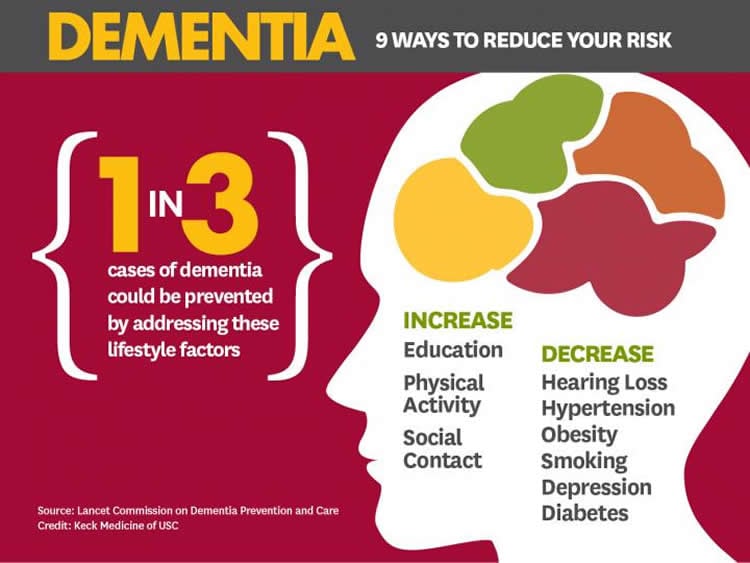Summary: Researchers have identified nine risk factors during different stages in life that may increase a person’s likelihood of developing dementia. At least 35% of dementia cases, researchers say, may be directly linked to these risk factors. By taking steps to reduce risks and by improving education, it is estimated that the incidence of dementia can be reduced by as much as 20%.
Source: USC.
The first Lancet Commission on Dementia Prevention and Care identifies powerful tools to prevent dementia and touts the benefits of nonmedical interventions for people with dementia.
Managing lifestyle factors such as hearing loss, smoking, hypertension and depression could prevent one-third of the world’s dementia cases, according to a report by the first Lancet Commission on Dementia Prevention and Care. Presented at the Alzheimer’s Association International Conference (AAIC) 2017 and published in The Lancet, the report also highlights the beneficial effects of nonpharmacologic interventions such as social contact and exercise for people with dementia.
“There’s been a great deal of focus on developing medicines to prevent dementia, including Alzheimer’s disease,” says commission member and AAIC presenter Lon Schneider, MD, professor of psychiatry and the behavioral sciences at the Keck School of Medicine of USC. “But we can’t lose sight of the real major advances we’ve already made in treating dementia, including preventive approaches.”
The commission brought together 24 international experts to systematically review existing research and provide evidence-based recommendations for treating and preventing dementia. About 47 million people have dementia worldwide and that number is expected to climb as high as 66 million by 2030 and 115 million by 2050.
Reducing dementia risk, beginning in childhood
The commission’s report identifies nine risk factors in early, mid- and late life that increase the likelihood of developing dementia. About 35 percent of dementia — one in three cases — is attributable to these risk factors, the report says.
By increasing education in early life and addressing hearing loss, hypertension and obesity in midlife, the incidence of dementia could be reduced by as much as 20 percent, combined.
In late life, stopping smoking, treating depression, increasing physical activity, increasing social contact and managing diabetes could reduce the incidence of dementia by another 15 percent.
“The potential magnitude of the effect on dementia of reducing these risk factors is larger than we could ever imagine the effect that current, experimental medications could have,” Schneider says. “Mitigating risk factors provides us a powerful way to reduce the global burden of dementia.”
A nonpharmacologic approach to treating dementia
The commission also examined the effect of nonpharmacologic interventions for people with dementia and concluded that they had an important role in treatment, especially when trying to address agitation and aggression.
“Antipsychotic drugs are commonly used to treat agitation and aggression, but there is substantial concern about these drugs because of an increased risk of death, cardiovascular adverse events and infections, not to mention excessive sedation,” Schneider says.

The evidence showed that psychological, social and environmental interventions such as social contact and activities were superior to antipsychotic medications for treating dementia-related agitation and aggression.
The commission also found that nonpharmacologic interventions like group cognitive stimulation therapy and exercise conferred some benefit in cognition as well.
The commission’s full report provides detailed recommendations in the areas of prevention, treating cognitive symptoms, individualizing dementia care, caring for caregivers, planning for the future following a dementia diagnosis, managing neuropsychiatric symptoms and considering the end of life.
The study will be presented at the Alzheimer’s Association International Conference (AAIC) 2017 in London.
Funding: This study was supported by the University College London, Alzheimer’s Society, UK, Economic and Social Research Council, Alzheimer’s Research UK.
Source: Meg Aldrich – USC
Image Source: NeuroscienceNews.com image is credited to Keck Medicine of USC.
Original Research: Abstract for “Dementia prevention, intervention, and care” by Prof Gill Livingston, MD, Andrew Sommerlad, MSc, Vasiliki Orgeta, PhD, Sergi G Costafreda, PhD, Jonathan Huntley, PhD, Prof David Ames, MD, Prof Clive Ballard, MD, Prof Sube Banerjee, MD, Prof Alistair Burns, MD, Prof Jiska Cohen-Mansfield, PhD, Claudia Cooper, PhD, Prof Nick Fox, MD, Laura N Gitlin, PhD, Prof Robert Howard, MD, Prof Helen C Kales, MD, Prof Eric B Larson, MD, Prof Karen Ritchie, PhD, Prof Kenneth Rockwood, MD, Elizabeth L Sampson, MD, Quincy Samus, PhD, Prof Lon S Schneider, MD, Prof Geir Selbæk, PhD, Prof Linda Teri, PhD, and Naaheed Mukadam, MSc in The Lancet. Published online July 19 2017 doi:10.1016/S0140-6736(17)31363-6
[cbtabs][cbtab title=”MLA”]USC “1 in 3 Cases of Dementia Are Preventable.” NeuroscienceNews. NeuroscienceNews, 20 July 2017.
<https://neurosciencenews.com/dementia-preventable-7136 />.[/cbtab][cbtab title=”APA”]USC (2017, July 20). 1 in 3 Cases of Dementia Are Preventable. NeuroscienceNew. Retrieved July 20, 2017 from https://neurosciencenews.com/dementia-preventable-7136 /[/cbtab][cbtab title=”Chicago”]USC “1 in 3 Cases of Dementia Are Preventable.” https://neurosciencenews.com/dementia-preventable-7136 / (accessed July 20, 2017).[/cbtab][/cbtabs]
Abstract
Dementia prevention, intervention, and care
Acting now on dementia prevention, intervention, and care will vastly improve living and dying for individuals with dementia and their families, and in doing so, will transform the future for society.
“Dementia prevention, intervention, and care” by Prof Gill Livingston, MD, Andrew Sommerlad, MSc, Vasiliki Orgeta, PhD, Sergi G Costafreda, PhD, Jonathan Huntley, PhD, Prof David Ames, MD, Prof Clive Ballard, MD, Prof Sube Banerjee, MD, Prof Alistair Burns, MD, Prof Jiska Cohen-Mansfield, PhD, Claudia Cooper, PhD, Prof Nick Fox, MD, Laura N Gitlin, PhD, Prof Robert Howard, MD, Prof Helen C Kales, MD, Prof Eric B Larson, MD, Prof Karen Ritchie, PhD, Prof Kenneth Rockwood, MD, Elizabeth L Sampson, MD, Quincy Samus, PhD, Prof Lon S Schneider, MD, Prof Geir Selbæk, PhD, Prof Linda Teri, PhD, and Naaheed Mukadam, MSc in The Lancet. Published online July 19 2017 doi:10.1016/S0140-6736(17)31363-6







